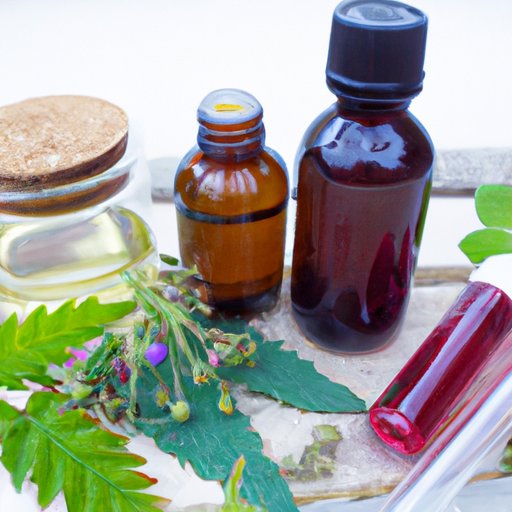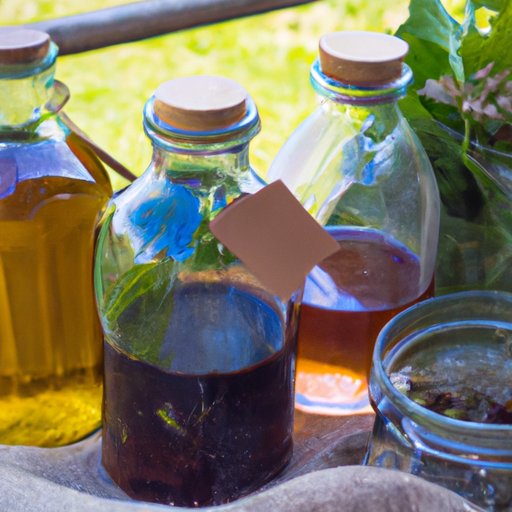Introduction
Tinctures are a type of herbal medicine that have been used for centuries to treat a variety of ailments. Tinctures are made by infusing herbs in alcohol or glycerin, resulting in a concentrated liquid form of the herb’s active constituents. This article will explore what tinctures are, how they are made, the different types and forms of tinctures, and their potential benefits, uses, and risks.

Exploring the Benefits of Tinctures: What They Are and How They Work
A tincture is a concentrated liquid extract of an herb. It is made by soaking the herb in either alcohol or glycerin, which extracts the active constituents of the herb. The result is a potent, concentrated liquid that can be taken orally or applied topically.
Tinctures are easy to make at home but are also widely available in health food stores, online, and from herbalists. The most common form of tincture is an alcohol-based solution, although glycerin-based tinctures are also available. Alcohol-based tinctures are usually more potent than glycerin-based tinctures, and they have a longer shelf life.
Tinctures are often used as a substitute for herbal teas or capsules. They are quick and easy to take, and they are more potent than other forms of herbal medicine. Tinctures can be taken orally or applied directly to the skin, depending on the desired effect.
Tinctures can be used to treat a wide range of conditions, including digestive issues, skin conditions, stress, insomnia, and headaches. They can also be used to boost immunity, improve circulation, reduce inflammation, and promote overall health and well-being.
Tinctures are generally safe and effective when used correctly. However, it is important to consult with a qualified health care practitioner before taking any herbal remedy, including tinctures.
A Comprehensive Guide to Tinctures: What Are They And How Do They Work?
When using tinctures, it is important to follow the instructions provided on the packaging. Generally speaking, it is recommended to take one teaspoon of tincture diluted in water two to three times per day. For topical applications, tinctures should be diluted in a carrier oil such as olive oil or coconut oil before being applied to the skin.
It is important to note that the potency of tinctures can vary greatly, so it is important to consult with a qualified health care practitioner to determine the proper dosage for your condition. Additionally, it is important to be aware of potential side effects, including dizziness, nausea, and headaches.
When taking tinctures, it is important to keep them stored in a cool, dark place away from direct sunlight. Additionally, it is important to keep tinctures out of reach of children and pets.

All You Need To Know About Tinctures: Their Uses and Effectiveness
Tinctures are made up of three main components: the herb, the solvent (alcohol or glycerin), and the preservative. The herb is the active ingredient in the tincture, and it is responsible for providing the medicinal benefits. The solvent is used to extract the active constituents from the herb, while the preservative helps to extend the shelf life of the tincture.
The benefits of tinctures include their concentrated potency, convenience, and long shelf life. Unlike herbal teas or capsules, tinctures are quickly absorbed into the bloodstream, allowing for fast relief from the symptoms of various conditions. Additionally, tinctures are easy to take and store, making them an ideal choice for those who are looking for a convenient way to take herbal medicine.
While tinctures are generally safe and effective when taken correctly, there are some potential risks associated with taking them. It is important to consult with a qualified health care practitioner before taking any herbal remedy, including tinctures.
An In-Depth Look at Tinctures: Understanding Their Uses and Benefits
Tinctures come in a variety of forms, including liquids, powders, and capsules. Each form has its own unique set of benefits and drawbacks, so it is important to research each type before deciding which one is right for you. Additionally, it is important to note that some forms of tinctures may contain alcohol, so it is important to check the label to ensure that the product is suitable for your needs.
The benefits of tinctures include their potency, convenience, and long shelf life. Tinctures are quickly absorbed into the bloodstream, allowing for fast relief from symptoms. Additionally, tinctures are easy to take and store, making them an ideal choice for those who are looking for a convenient way to take herbal medicine.
It is important to be aware of potential side effects when taking tinctures, including dizziness, nausea, and headaches. Additionally, it is important to consult with a qualified health care practitioner before taking any herbal remedy, including tinctures.
Discovering the Power of Tinctures: What They Are and How They Work
Tinctures are a powerful form of herbal medicine that can be used to treat a wide range of conditions. They are made by soaking herbs in either alcohol or glycerin, resulting in a concentrated liquid form of the herb’s active constituents. Tinctures can be taken orally or applied topically, depending on the desired effect.
When taking tinctures, it is important to follow the instructions provided on the packaging. Generally speaking, it is recommended to take one teaspoon of tincture diluted in water two to three times per day. For topical applications, tinctures should be diluted in a carrier oil such as olive oil or coconut oil before being applied to the skin.
It is important to be aware of potential side effects when taking tinctures, including dizziness, nausea, and headaches. Additionally, it is important to consult with a qualified health care practitioner before taking any herbal remedy, including tinctures.
A Beginner’s Guide to Tinctures: Everything You Need to Know
Tinctures are a form of herbal medicine that have been used for centuries to treat a variety of ailments. They are made by soaking herbs in either alcohol or glycerin, resulting in a concentrated liquid form of the herb’s active constituents. Tinctures can be taken orally or applied topically, depending on the desired effect.
When taking tinctures, it is important to follow the instructions provided on the packaging. Generally speaking, it is recommended to take one teaspoon of tincture diluted in water two to three times per day. For topical applications, tinctures should be diluted in a carrier oil such as olive oil or coconut oil before being applied to the skin.
It is important to be aware of potential side effects when taking tinctures, including dizziness, nausea, and headaches. Additionally, it is important to consult with a qualified health care practitioner before taking any herbal remedy, including tinctures.
Conclusion
Tinctures are a powerful form of herbal medicine that can be used to treat a wide range of conditions. They are made by soaking herbs in either alcohol or glycerin, resulting in a concentrated liquid form of the herb’s active constituents. Tinctures can be taken orally or applied topically, depending on the desired effect.
When taking tinctures, it is important to follow the instructions provided on the packaging. Additionally, it is important to consult with a qualified health care practitioner before taking any herbal remedy, including tinctures. With the proper guidance and precautions, tinctures can be an effective and safe way to take herbal medicine.
(Note: Is this article not meeting your expectations? Do you have knowledge or insights to share? Unlock new opportunities and expand your reach by joining our authors team. Click Registration to join us and share your expertise with our readers.)
